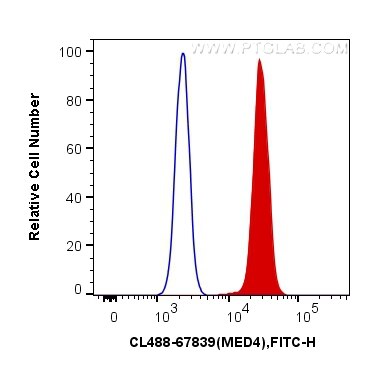Validation Data Gallery
Tested Applications
| Positive FC (Intra) detected in | HepG2 cells |
| Positive FC detected in | HepG2 cells |
Recommended dilution
| Application | Dilution |
|---|---|
| Flow Cytometry (FC) (INTRA) | FC (INTRA) : 0.40 ug per 10^6 cells in a 100 µl suspension |
| Flow Cytometry (FC) | FC : 0.40 ug per 10^6 cells in a 100 µl suspension |
| It is recommended that this reagent should be titrated in each testing system to obtain optimal results. | |
| Sample-dependent, Check data in validation data gallery. | |
Product Information
CL488-67839 targets MED4 in FC (Intra) applications and shows reactivity with Human, Mouse, rat samples.
| Tested Reactivity | Human, Mouse, rat |
| Host / Isotype | Mouse / IgG2a |
| Class | Monoclonal |
| Type | Antibody |
| Immunogen |
CatNo: Ag8562 Product name: Recombinant human MED4 protein Source: e coli.-derived, PET28a Tag: 6*His Domain: 1-270 aa of BC005189 Sequence: MAASSSGEKEKERLGGGLGVAGGNSTRERLLSALEDLEVLSRELIEMLAISRNQKLLQAGEENQVLELLIHRDGEFQELMKLALNQGKIHHEMQVLEKEVEKRDGDIQQLQKQLKEAEQILATAVYQAKEKLKSIEKARKGAISSEEIIKYAHRISASNAVCAPLTWVPGDPRRPYPTDLEMRSGLLGQMNNPSTNGVNGHLPGDALAAGRLPDVLAPQYPWQSNDMSMNMLPPNHSSDFLLEPPGHNKEDEDDVEIMSTDSSSSSSESD 相同性解析による交差性が予測される生物種 |
| Full Name | mediator complex subunit 4 |
| Calculated molecular weight | 270 aa, 30 kDa |
| Observed molecular weight | ~36 kDa |
| GenBank accession number | BC005189 |
| Gene Symbol | MED4 |
| Gene ID (NCBI) | 29079 |
| RRID | AB_2934573 |
| Conjugate | CoraLite® Plus 488 Fluorescent Dye |
| Excitation/Emission maxima wavelengths | 493 nm / 522 nm |
| Form | |
| Form | Liquid |
| Purification Method | Protein A purification |
| UNIPROT ID | Q9NPJ6 |
| Storage Buffer | PBS with 50% glycerol, 0.05% Proclin300, 0.5% BSA{{ptg:BufferTemp}}7.3 |
| Storage Conditions | Store at -20°C. Avoid exposure to light. Stable for one year after shipment. Aliquoting is unnecessary for -20oC storage. |
Background Information
MED4 is a component of the Meditor complex, which is a coactivator involved in the regulated transcription of nearly all RNA polymerase II-dependent genes. Meditor functions as a bridge to convey information from gene-specific regulatory proteins to the basal RNA polymerase II transcription machinery. It also have an alternative name called "Activator-recruited cofactor 36 kDa component (ARC36) ".
Protocols
| Product Specific Protocols | |
|---|---|
| FC protocol for CL Plus 488 MED4 antibody CL488-67839 | Download protocol |
| Standard Protocols | |
|---|---|
| Click here to view our Standard Protocols |

